Key takeaways:
- Photography forums foster community, providing valuable feedback and inspiration to help photographers grow and refine their skills.
- Engaging in discussions with an open mindset and active listening can deepen connections and enhance learning experiences.
- Presenting your work with context and inviting feedback leads to richer conversations and opportunities for personal growth.
- Avoid common mistakes like neglecting technical details and rushing to share, as these can undermine the quality of your photography.
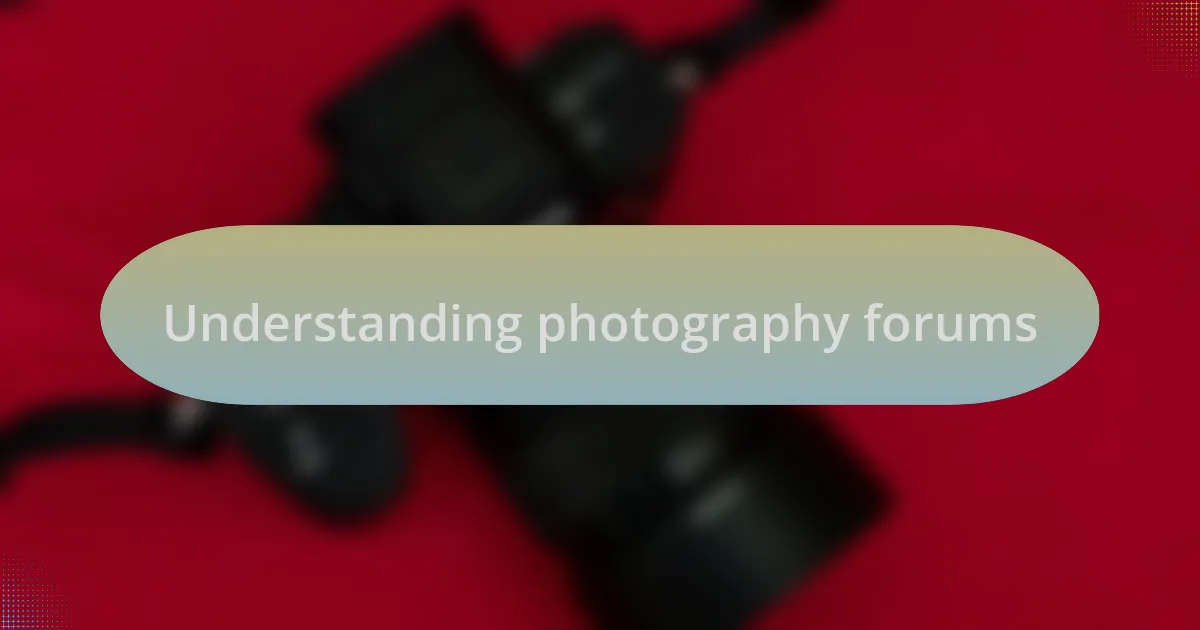
Understanding photography forums
Photography forums serve as vibrant communities where enthusiasts and professionals alike can gather to share knowledge, experiences, and techniques. I remember my first encounter with a forum; it felt like stepping into a room full of passionate people who understood my love for capturing moments. Have you ever felt that rush when someone appreciates your work? That’s the kind of connection these forums foster.
Within these online spaces, you’ll find threads that range from technical discussions about camera gear to heartfelt critiques of members’ photos. I once posted a photograph that I was particularly proud of, and after receiving constructive feedback, I realized how invaluable that perspective was. It highlighted the importance of viewing your work through different eyes, pushing you to grow and refine your skills.
Moreover, photography forums can be a treasure trove of inspiration, sparking creativity that you may not have found otherwise. Have you ever struggled with a creative block? I certainly have, and more than once, a simple discussion on a forum reignited my passion. These communities offer not only practical advice but also a sense of belonging, reminding you that you’re not alone in your journey as a photographer.

Benefits of joining photography forums
Engaging with photography forums opens up a wealth of knowledge that can accelerate your growth as a photographer. Each interaction feels like exchanging secrets with fellow enthusiasts who have walked similar paths. I recall a moment when I was grappling with exposure settings; a simple tip from a forum member not only clarified my confusion but also transformed my approach to outdoor photography.
One of the standout benefits of these forums is the opportunity to connect with diverse perspectives. I vividly remember a thread where photographers from various backgrounds shared their unique editing styles. It was fascinating to see how different creative choices influence the final image. Have you ever found inspiration in a technique you hadn’t considered? Sharing these experiences can leave you with a treasure trove of ideas to experiment with in your own work.
Moreover, the camaraderie within photography forums can serve as a vital support system. During a tough period in my photography journey, connecting with others who understood the ups and downs was incredibly comforting. In those moments, I realized that the friendships formed in these spaces are just as valuable as the technical advice. Doesn’t knowing you have a community cheering you on make the challenges feel less daunting?
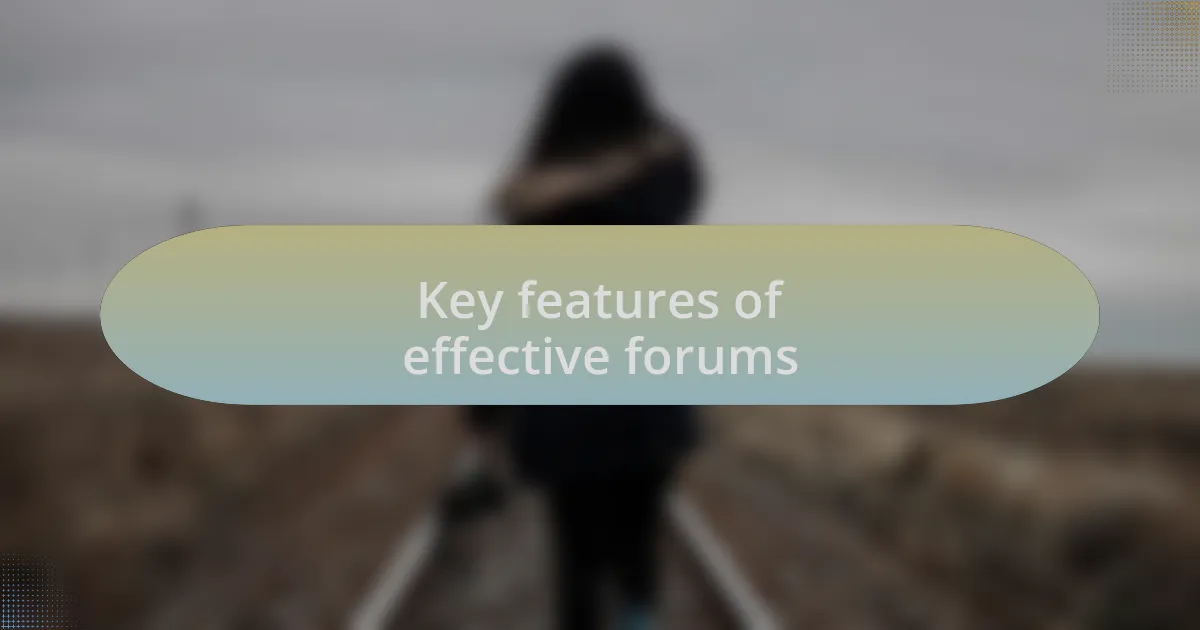
Key features of effective forums
One key feature of effective forums is the ease of navigation. I remember joining a forum where I struggled to find topics of interest, which can be frustrating and discouraging. A well-structured layout with clear categories not only saves time but also encourages more participation, as users can quickly engage with discussions that matter to them. Isn’t it great when you can dive right into a conversation without unnecessary hassle?
Another important aspect is the presence of knowledgeable and active moderators. Having someone to maintain a positive environment is crucial. I once encountered a discussion that had spiraled out of control due to conflicting opinions, but the moderators stepped in just in time. They redirected the conversation back to a respectful exchange of ideas. It reinforced my belief that forums thrive when there are guardians of constructive dialogue. Don’t you find it comforting when there’s someone ensuring the conversation stays focused?
Lastly, robust post formatting options can significantly enhance user engagement. In a recent thread, I shared a photo alongside a written tutorial, clearly formatted to guide readers through my process. The feedback was overwhelming, and it sparked a deeper discussion about creative workflows. When users can showcase their work compellingly, it fosters a sense of ownership and pride within the community. Isn’t that what every photographer seeks—to share their vision and connect with others?

How to engage in discussions
Engaging in discussions on a photography forum requires an open mindset and a willingness to share personal experiences. I remember joining a conversation about post-processing techniques where someone opened up about their struggle with a specific editing software. I chimed in with my own early challenges, and suddenly, we were exchanging tips and tricks that benefited everyone involved. Wouldn’t it be amazing if we could all feel comfortable enough to share our struggles and successes?
Active listening plays a crucial role in fostering meaningful dialogue. I once participated in a thread where someone asked for feedback on their latest photo. Instead of just dropping a critique, I took the time to read other comments, noting the praise and constructive criticism. This process guided my response, and it felt rewarding to contribute in a way that truly resonated with the original poster. Engaging in discussions is much more than voicing opinions; it’s about connecting with others on a deeper level.
Don’t shy away from asking questions to spark conversation. In one memorable thread, I asked a fellow photographer about their choice of lens for capturing landscapes. Their response not only led to a fascinating discussion about equipment preferences but also broadened my understanding of composition. Questions create opportunities for dialogue, and by showing genuine curiosity, I often find that discussions flow more naturally. Can you imagine how many insights await just by being open to asking?
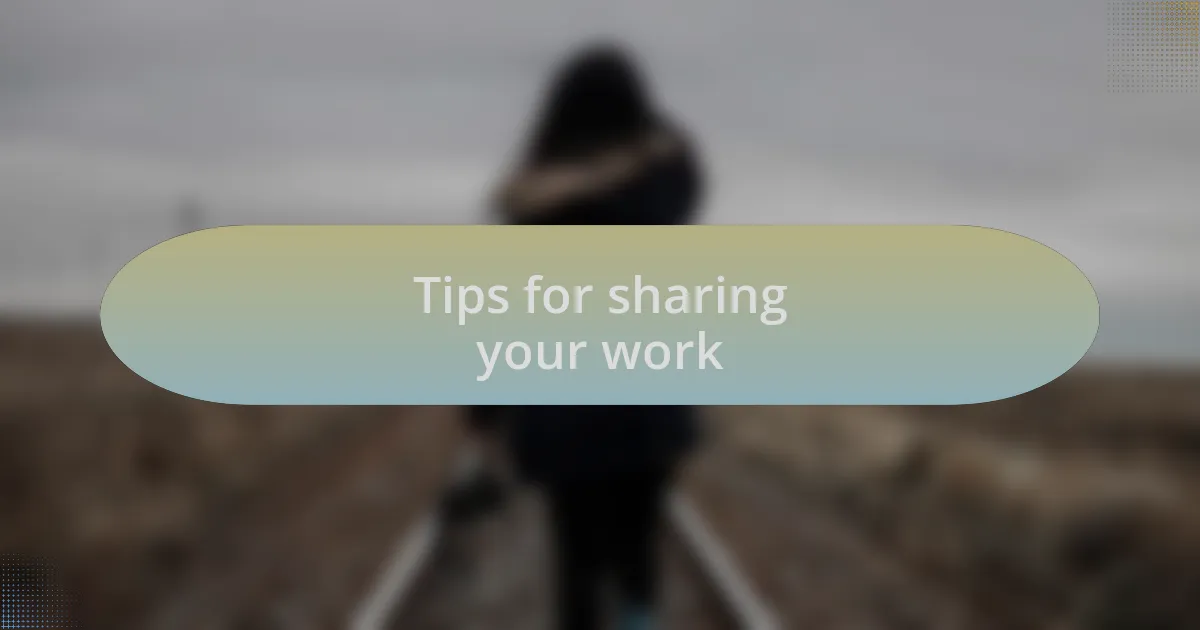
Tips for sharing your work
When sharing your work on a photography forum, it’s essential to present your images with context. I once posted a series of travel photos without much explanation, and while I received some compliments, the deeper discussions didn’t spark until I shared the story behind each image. Providing context not only draws people in but also invites them to see your work from your unique perspective. Isn’t it incredible how a little background can change how someone perceives your art?
Don’t underestimate the power of sincere engagement with your audience. I remember sharing a portrait that I struggled with capturing in bright sunlight. I wrote about my experiences and the techniques I employed to overcome the challenges. The response was overwhelming; not only did viewers appreciate the photo, but they also shared their own trials with similar lighting. This exchange turned into a rich conversation that enriched my understanding of both photography and connection. Which is more rewarding: just sharing an image, or sharing the lessons behind it?
Lastly, always welcome feedback, even if it feels intimidating initially. In my early years, I posted a favorite image only to receive a critique that surprised me. Instead of feeling discouraged, I took the comments to heart and saw them as stepping stones for growth. Now, I actively invite constructive criticism, knowing that each comment brings me closer to refining my craft. What if I had dismissed those critiques? I wouldn’t be where I am today. Sharing your work is a two-way street, after all; the feedback can be just as valuable as the exposure itself.
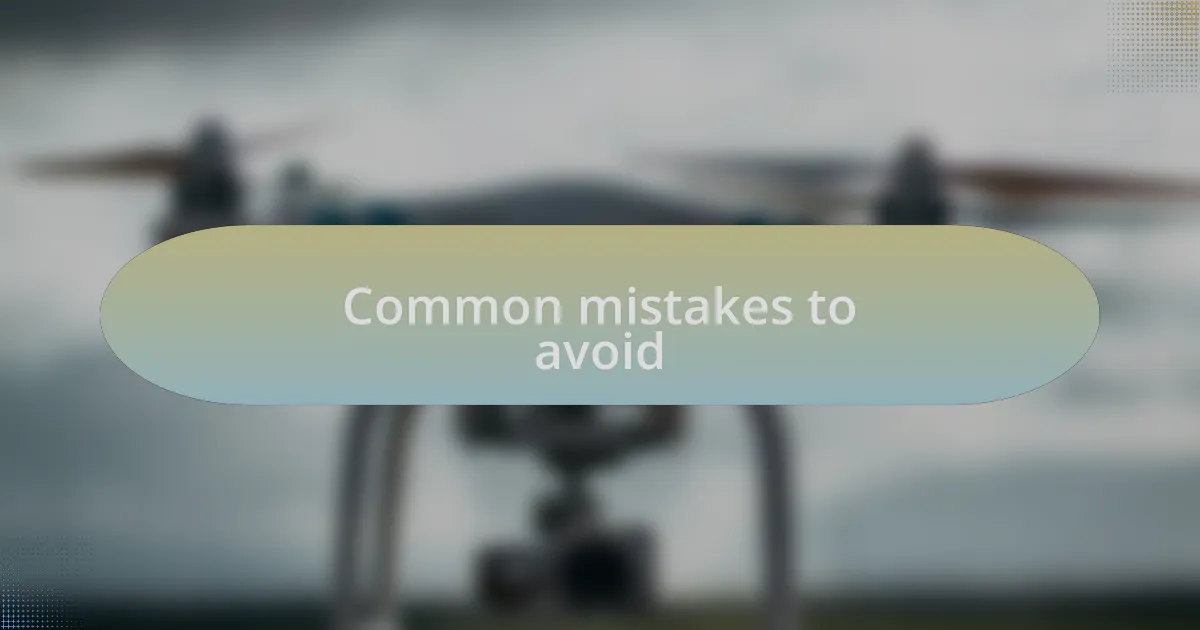
Common mistakes to avoid
It’s all too easy to overlook the basics, especially when you’re caught up in the excitement of sharing your photography. I remember one time I uploaded a stunning landscape shot without checking my settings first. It turns out, my white balance was way off, and instead of vibrant colors, I got an image that looked washed out. A simple check could’ve saved me the embarrassment of that post. Have you ever posted something only to realize later that a tiny mistake completely undermined your hard work?
Another common pitfall is not paying attention to your composition. During my early days, I was so focused on the subject that I neglected how it fit within the frame. I snapped a photo of my favorite tree, capturing it beautifully, but there was an unflattering trash can in the corner. It’s these small details that can distract viewers and diminish the impact of your work. Isn’t it interesting how a single element can shift the entire focus of the image?
Lastly, rushing to share can often lead to regret. I vividly recall uploading a set of concert photos straight after an event without giving them a chance to breathe. Later, I found myself dissatisfied with the editing or the choice of images. Taking a moment to refine your edits can elevate the quality of your work immensely. How many times have you hit “post” and then wished you could take it back? Patience, my friends, is as vital as that click of the shutter.
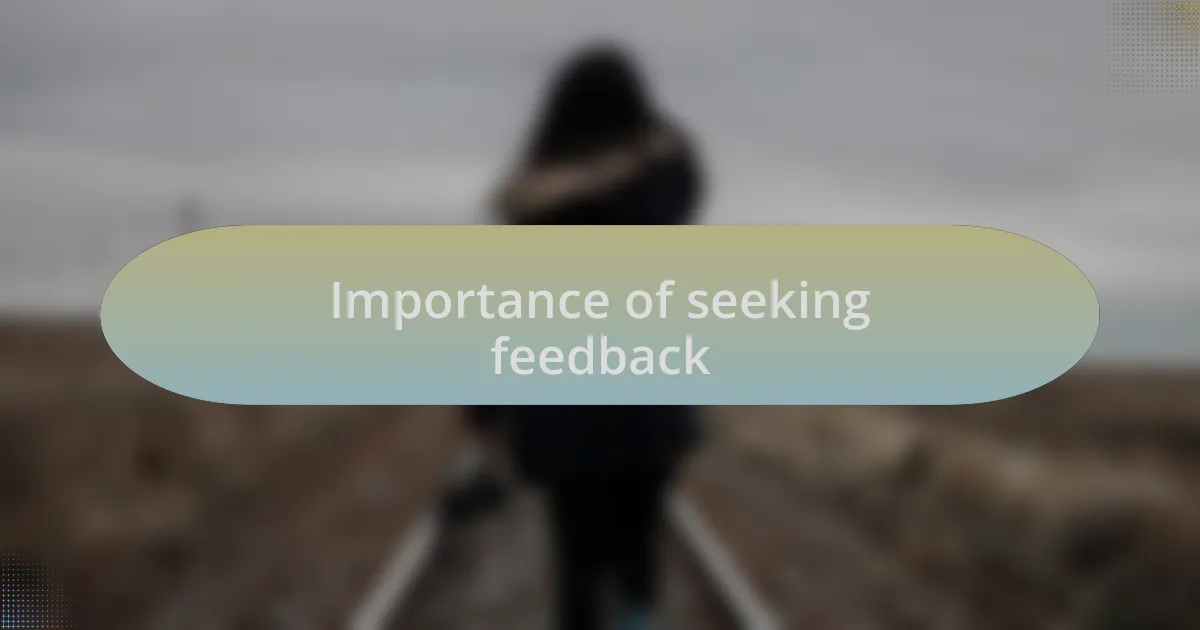
Importance of seeking feedback
Seeking feedback is a crucial step in growing as a photographer. One time, after sharing a portrait in an online group, I anticipated praise, but instead, I received constructive criticism about my lighting choices. At first, I felt defensive, but reflecting on the feedback allowed me to see the image through a different lens. Isn’t it fascinating how an outsider’s perspective can reveal details you might’ve missed?
When I started actively seeking input on my work, my photography improved exponentially. One of my peers pointed out the importance of storytelling in images, which was an eye-opener for me. I had never considered that my photos could convey more than just a scene; they could capture a moment or emotion. What if I hadn’t asked for that feedback? Would I still be taking technically sound photos without depth?
Embracing feedback, even when it stings, is part of the creative journey. I recall sharing a series of street photos and getting pointed advice about framing. Initially, I struggled with the critiques, feeling vulnerable about my artistry. But those suggestions sparked a transformative improvement in how I viewed composition. Have you ever had advice change your perspective so profoundly? It’s in these moments that we can truly evolve as artists.